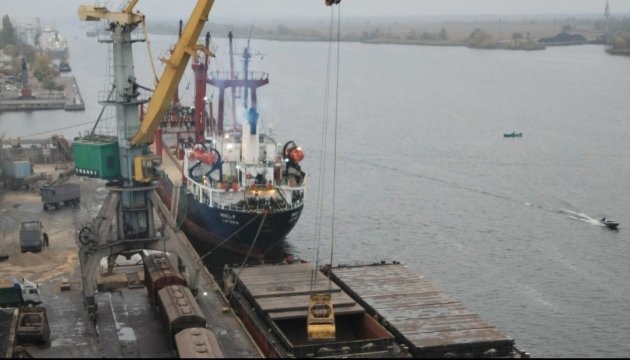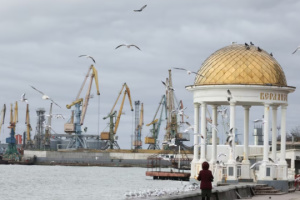
Russia delaying sea exports from Ukraine for almost two days
The relevant report was released by the Monitoring Group of BlackSeaNews and the Black Sea Institute of Strategic Studies.
“In December 2021, the average duration of artificial delays of vessels going from the Black Sea to the Ukrainian ports on the Sea of Azov − Mariupol and Berdiansk − by the Russian Federation was 20.3 hours (in November – 14.1; on average in 2020 – 23.5). In December 2021, a total of 60 vessels passed through the Kerch Strait from the Black Sea in the direction of the Ukrainian ports on the Sea of Azov – Mariupol and Berdiansk,” the report reads.
As noted, in December 2021, vessels carrying exports from Mariupol and Berdiansk were delayed at the exit from the Sea of Azov by the Russian Federation for an average of 45.5 hours (on average in 2020 – 29.6; in November – 35.5).
In December 2021, a total of 55 vessels passed through the Kerch Strait from the Ukrainian ports on the Sea of Azov – Mariupol and Berdiansk – in the direction of the Black Sea.
From 22 October 2018 to November 2021, there were no delays of ships while on the move, going from/to Berdiansk and Mariupol, in the Sea of Azov, because the Ukrainian Navy boats were escorting the vessels.
“From December 2018 to December 2020, due to the threat of the ‘Azov package’ of international sanctions against Russian ports on the Sea of Azov, there was a slight decrease in the average duration of artificial delays of ships at the exit from the Sea of Azov to the Black Sea: in 2018 − 79.5 hours; in 2019 − up to 37.4 hours; in 2020 − 29.6 hours per vessel. In 2021, this figure has increased significantly to 39.8 hours per vessel and already exceeded those for 2019 and 2020,” reads the report.
Prolonged inspections in the Kerch Strait of merchant ships going to/from the Ukrainian ports on the Sea of Azov (Mariupol, Berdiansk) were initiated by the Coast Guard of the FSB Border Service in May-June 2018 – after the commissioning of the Kerch Bridge. The pretext for such inspections is the possible presence aboard ships leaving the Ukrainian ports of sabotage groups and explosives to destroy the Kerch Bridge. Prior to the beginning of the de facto blockade of Ukrainian ports in May 2018, the average waiting time for permission to pass through the Kerch Strait was 5-7 hours. In the second half of 2018, this figure reached 80-115 hours. The situation was later eased due to political and diplomatic pressure on Russia from Western countries.
The reduction in the time of artificial delays of vessels in the Kerch Strait since December 2018 was due to the imminent threat of the introduction of the “Azov package” of international sanctions against the Russian ports on the Sea of Azov and the Black Sea.
In 2019, the average duration of artificial delays per vessel was 37.4 hours; in 2020, this figure dropped to 29.6 hours. In November 2020-April 2021, there was a considerable increase in the duration of artificial delays, which reached an average of 53 hours.
The maximum average duration of artificial delays of ships leaving the Sea of Azov in 2021 was observed in April – 70 hours. The longest duration of delays of individual vessels at the exit from the Sea of Azov (compared to the waiting time at the entrance to the Sea of Azov) was recorded in the first half of April 2021, when it reached 220 hours, i.e. almost 10 days.
ol





